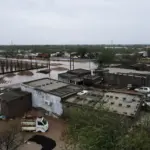UNITED NATIONS, Sep 06 (APP): A UN regional conference on food security has called for innovation, solidarity, coherence and strong partnership among and within countries of Asia and the Pacific for the region to rebound from the damage caused by the coronavirus pandemic and the ongoing effects of chronic undernourishment.
That was a call made by more than 40 member countries virtually gathered at the Rome-based Food and Agriculture Organization (FAO) on the concluding day of the four-day regional conference.
About 750 participants, including representatives of the private sector and civil society, pledged to work to transform food systems, making them more sustainable, productive and resilient, and to feed a hungry world in a way that is profitable for farmers yet produces healthy food that is accessible to all.
Big data, digital economy and mobile technology will help producers achieve such transformations, Qu Dongyu, FAO Director-General said on Friday, the Conference’s final day.
For instance, a smartphone in the hands of a smallholder farmer is a “new farming tool”, he added.
“Leveraging data, innovation and technology has shown that, here in Asia and the Pacific, we have brilliant minds, scientists and an entrepreneurial spirit that will lead us through the challenges presented by COVID-19 and help us conquer malnutrition and poverty,” said Qu.
Agricultural innovation can also reduce back-breaking drudgery, and regional food chains can benefit from innovations such as drones, satellite imagery, big data and block chains, the Conference heard.
The Regional Conferences, held every two years, are a platform for ministers of agriculture and senior officials, NGOs, private sector and other stakeholders in the field to explore joint and coherent solutions to shared challenges confronting food security and agriculture. The 2020 Regional Conference was held from 1 to 4 September.
According to FAO, the Asia-Pacific region – the planet’s most populous – is also home to over half of the world’s undernourished people, and the number is feared to rise, with the impact of COVID-19. In southern Asia alone, the figure could rise by a third, to some 330 million in the next decade.
Conference Chair Yeshey Penjor, Minister for Agriculture and Forests of Bhutan, reiterated the need to strengthen collaboration to deal with the challenges.
“We must prepare for higher risks ahead of us and make sure that there is sustainability in the food supply chain,” he said.
New solutions, such as the FAO’s Hand in Hand (HIH) Initiative, which “matches” stakeholders, bringing the right partners together at the right time, can help.
According to FAO, some 44 countries with limited capacity or hit by crisis have been invited to join the Initiative as beneficiaries, 80 as contributors, and some 20 have expressed interest to join as both.
The rollout of the Initiative coincided with the onset of COVID-19 and the urgent need to deal with its complex impacts on agri-food systems, said FAO, adding that the Initiative is helping support evidence-based efforts to prevent breakdown of and address emerging threats to food systems.
“The HIH approach to analysis and partnership-building has proven to be a useful model for coordinating integrated rapid response to COVID-19 impacts on food systems, particularly at the local or territorial level,” it added.
FAO Director-General Qu also said that while the COVID-19 has hit countries and societies, innovations are bringing people closer together.
“So while we are separated by some 11 time zones, we have still managed to come together, have thought-provoking discussions and reach consensus on a number of important issues,” he added.







